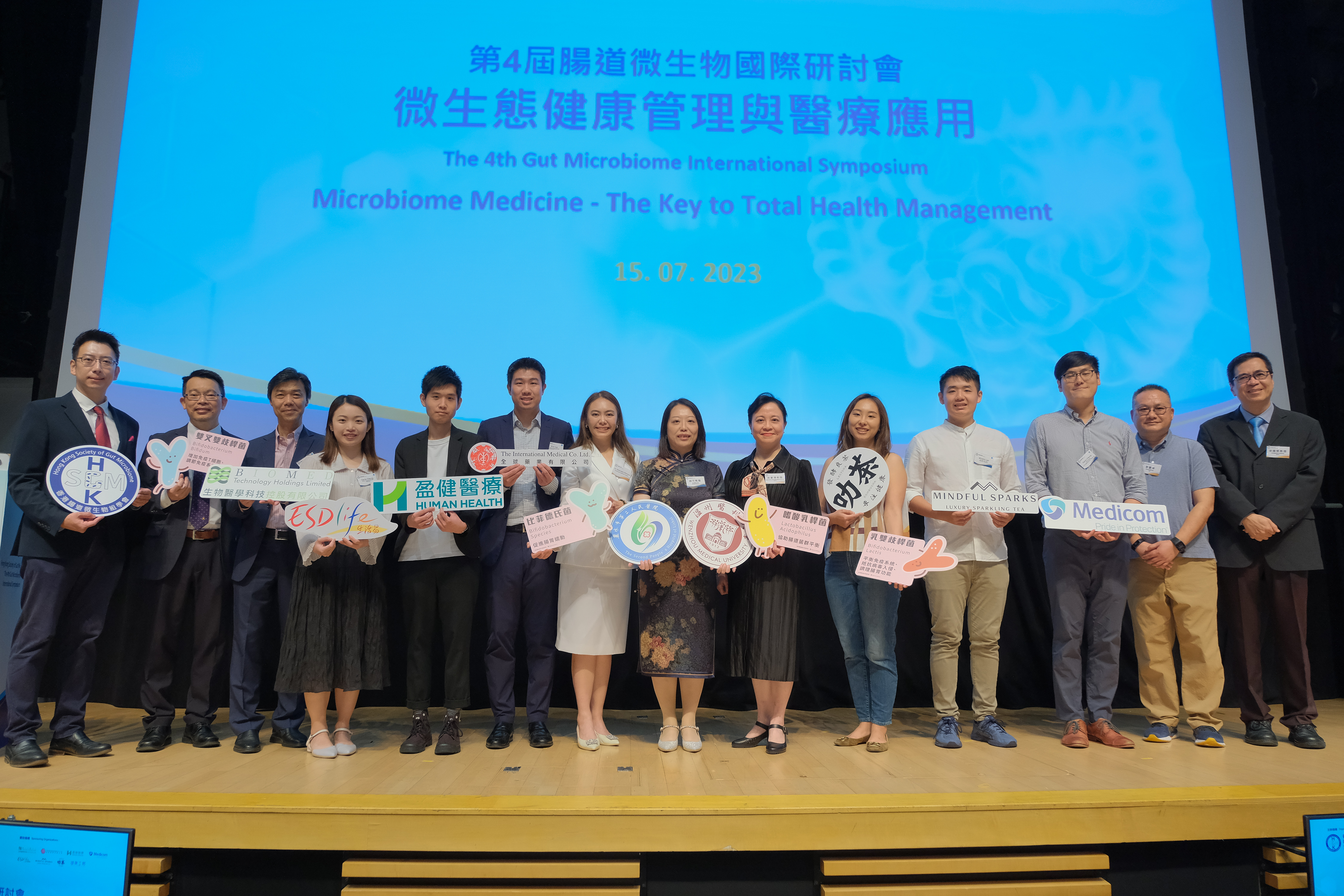At the Gut Microbiome International Symposium held on 15 July 2023, a panel of medical experts and researchers concluded that gut microbiome-based health management can be an effective strategy of disease prevention and treatment. 
Hong Kong Society of Gut Microbiome revealed at the symposium that it will launch a clinical study on the impact of novel probiotics intervention on severe depression and insomnia in collaboration with mental health experts from the mainland. The project is purported to explore evidence-based remedies for mental disorders that work alongside conventional medication.
Health and Diseases – Gut Microbiome Matters
Hong Kong Society of Gut Microbiome hosted its 4th Gut Microbiome International Symposium on 15th July 2023 at the Charles Kao Auditorium. The event discussing Microbiome Medicine - The Key to Total Health Management was attended by more than 200 people. The Public Mental Health Centre, Wenzhou Medical University is the co-organiser of the symposium.
Dr Steven Loo, representative of the HKSGM remarked in his welcome speech that despite the growing awareness on the significance of gut microbiome, its application in prevention of diseases and health management is underdeveloped in Hong Kong. In particular, the use of microbiome-based approach to mental disorders such as depression, and major health concerns like Alzheimer's disease, immune system diseases and cancer which prevail in our ageing population. "The HKSGM is dedicated to research on and to promote gut microbiome health management. By doing so, we hope to help people prevent certain health issues and thus reduce the burden of medical expenses on individuals and the society at large."
Clinical study for Mental Health
According to the World Health Organization's scientific brief, global prevalence of anxiety and depression increased by a massive 25% in the first year of Covid-19 pandemic. HKSGM's community research also found that the people who had sleep problems or depression were prone to lack specific probiotic strains in their gut. Dr Loo pointed out that in the face of the increasingly severe mental health crisis, there is a dire need of more diverse, evidence-based and cost-effective solutions to alleviate mental health problems like depression and anxiety. Gut microbiome health management can be one of the options.
Dr Yu Yan Qui, Senior Researcher, School of Public Health, Fudan University cited meta-analyses that many clinical research and community research had indicated the positive impacts of probiotics on alleviating depression and sleep problems. However, the studies are mostly foreign and the sample sizes are rather small.
HKSGM, Wenzhou Medical University and the Second People's Hospital of Lishui City have reached an agreement on a one-year collaborative research project which will look into the efficacy of probiotics supplement for severe depression and insomnia. The study will recruit 500 participants. Being one of the largest cross-disciplinary research on mental health and gut microbiome, the study is expected to gather extensive data from the Chinese population and its findings will provide valuable implication for mental health practitioners in Hong Kong, the Mainland and even overseas, benefitting public mental health in the long run.
A New Way to Treat Alzheimer's Disease and Cancer
Seven speakers spoke on gut microbiome therapeutics for different health issues and the related research results.
Currently, there are few proven therapies to alleviate Alzheimer's disease or curb its development. Professor Lin Zhi Xiu, Director in the School of Chinese Medicine, the Chinese University of Hong Kong (CUHK) pointed out that Alzheimer's disease has a strong association with gut microbiome. His research in mouse model has shown that patchouli alcohol, a type of Chinese herbal medicine can ameliorate cognitive deficits through modulating gut microbiota. By suppressing the accumulation of amyloid deposition, patchouli alcohol works to improve cognitive functions such as memory and spatial senses. The study indicates the possible application of patchouli alcohol in the treatment of Alzheimer's disease and gives strong evidence on the link between Alzheimer's disease and dysbiosis.
Professor Stephen Tsui, Professor and Associate director (Research) in the School of Biomedical Sciences, CUHK talked about unlocking the link between gut microbiome, asthma and cancer. He cites a study findings that the prevalence of asthma in Hong Kong is 10 times higher than that in Heyuan on the Mainland, saying that other than gene, gut dysbiosis due to excessive hygiene and meat-based diet is also a major culprit of having asthma. Gut microbiome conditions are found to have a direct linkage with the efficacy of asthma treatment, according to a latest research study. Also, Professor Tsui warned that pathogenic microbiota in the gut promotes chronic inflammation which could impair the immune system and trigger the increase of cytokine and cancer-inducing substances in the body, leading to the development and metastasis of cancer cells.
Professor Sun Bao Qing, Vice Director of The National Clinical Research Center for Respiratory Diseases shared her insights on the epidemiology of food allergies from the gut microbiome perspective. The fact being that incidences of food allergies are on the rise across the Mainland, more and more evidence has emerged, pointing to the significant role of gut microbiome in the development of immune system during infancy. Hence, how to ensure gut microbiome health for infants is considered one of the most critical research directions. For example, breastfeeding and caesarean section are found to be associated with gut microbiome conditions. Researchers are looking to how to reduce food allergies risk by early lifestyle modification, including precision probiotics supplement. Severe food allergies can be fatal and cause other health issues such as malnutrition and mental distress. Professor Sun hopes to see more research inputs in the area of microbiome therapeutics.
Probiotics As Cure for Eczema and Psoriasis
In addition, Dr Steven Loo said there had been considerable evidence that supports gut microbiome intervention is an effective way to treat eczema (atopic dermatisits)and psoriasis.
Dr Loo presented the findings of the HKSGM's research studies on the topic. More than 80 percent of the eczema patients, who had taken prescribed probiotics formula for two months, turned out to have their Eczema Area and Severity Index (EASI) score lowered, an indicator of improvement. Those responders exhibited elevated relative abundance of Fecalibacterium, Lactobacillus, etc.
On psoriasis, the HKSGM conducted a clinical study in collaboration with the Hong Kong Psoriasis Patients Association in 2021. The subjects reported significant decrease in PASI score and DLQI score which reflect significant improvement of dysbiosis, upon the completion of a two months administration of E3 probiotic formula. The data also indicates that the participants had higher Firmicutes / Bacteroidetes ratios in their gut lining, compared to the control group.
Mr Gary Lai, Chairman, Hong Kong Psoriasis Patients Association , who took part in the study as a patient said most of the participants had their symptoms relieved following the precision probiotics treatment regime, even for those with recurring symptoms and those suffering from the disease for decades reported positive responses. Many participants are grateful for the alleviation of the comorbid health problems including cardiovascular problems , anxiety and joint pains.
Dr Rittiwong, functional medicine expert from Thailand shared her experience at hospital. One of her patients had recurring skin problems after a 30 days antibiotic treatment. Dr Rittiwong prescribed personalised probiotics supplement based on her personal gut microbiome test results. After the microbiome therapy, coupled with detoxification, and dietary and lifestyle modification, that patient has had her skin conditions improved significantly.
Hashtag: #HKSGM
https://www.facebook.com/hkgutmicrobiome
The issuer is solely responsible for the content of this announcement.
Hong Kong Society of Gut Microbiome
Hong Kong Society of Gut Microbiome (HKSGM) is a not-for-profit organization founded in 2019 by a group of scientists, medical experts and researchers specializing in gut microbiome science. The HKSGM is committed to promote microbiome knowledge and microbiome-based health management through public education, training, research and advocacy.





















